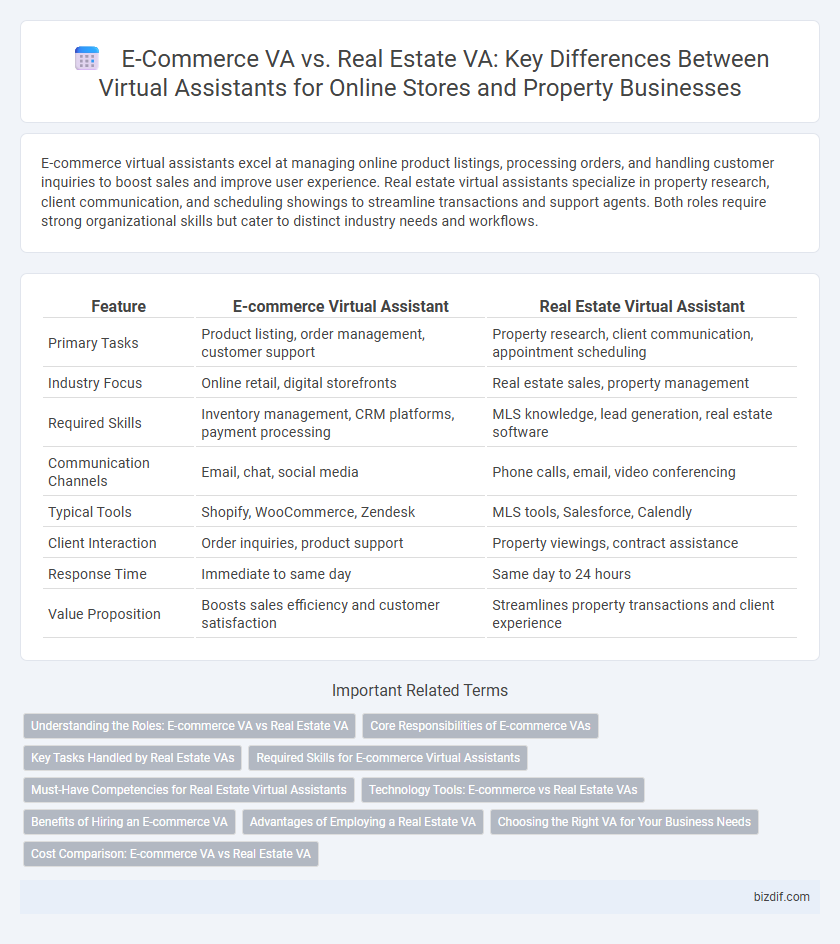E-commerce virtual assistants excel at managing online product listings, processing orders, and handling customer inquiries to boost sales and improve user experience. Real estate virtual assistants specialize in property research, client communication, and scheduling showings to streamline transactions and support agents. Both roles require strong organizational skills but cater to distinct industry needs and workflows.
Table of Comparison
| Feature | E-commerce Virtual Assistant | Real Estate Virtual Assistant |
|---|---|---|
| Primary Tasks | Product listing, order management, customer support | Property research, client communication, appointment scheduling |
| Industry Focus | Online retail, digital storefronts | Real estate sales, property management |
| Required Skills | Inventory management, CRM platforms, payment processing | MLS knowledge, lead generation, real estate software |
| Communication Channels | Email, chat, social media | Phone calls, email, video conferencing |
| Typical Tools | Shopify, WooCommerce, Zendesk | MLS tools, Salesforce, Calendly |
| Client Interaction | Order inquiries, product support | Property viewings, contract assistance |
| Response Time | Immediate to same day | Same day to 24 hours |
| Value Proposition | Boosts sales efficiency and customer satisfaction | Streamlines property transactions and client experience |
Understanding the Roles: E-commerce VA vs Real Estate VA
E-commerce virtual assistants specialize in managing online stores, handling inventory updates, customer inquiries, order processing, and digital marketing tasks such as product listing optimization and social media management. Real estate virtual assistants focus on supporting agents with activities like lead generation, appointment scheduling, property research, and managing client communications to streamline the sales process. Understanding these distinct roles helps businesses allocate resources effectively and enhances operational efficiency in their respective industries.
Core Responsibilities of E-commerce VAs
E-commerce virtual assistants specialize in managing online store operations, including inventory management, order processing, customer service, and product listing optimization. Their core responsibilities also encompass handling payment processing, tracking shipments, and managing returns or refunds to enhance customer satisfaction. These tasks require familiarity with e-commerce platforms like Shopify, WooCommerce, and Amazon Seller Central, ensuring smooth digital storefront management and improved sales performance.
Key Tasks Handled by Real Estate VAs
Real estate virtual assistants specialize in managing property listings, coordinating client communications, scheduling property showings, and handling transaction documentation to support real estate agents efficiently. They perform market research, update databases with potential leads, and assist with marketing campaigns tailored to real estate services. These tasks ensure seamless operations and enhanced client engagement within the real estate industry.
Required Skills for E-commerce Virtual Assistants
E-commerce virtual assistants require skills in managing product listings, processing orders, and handling customer service through chat or email platforms. Proficiency in inventory management software, basic graphic design for product images, and knowledge of SEO for online stores is essential. Unlike real estate VAs, e-commerce VAs must be adept at multitasking across various digital sales channels to optimize product visibility and sales performance.
Must-Have Competencies for Real Estate Virtual Assistants
Real estate virtual assistants must possess competencies such as proficiency in property listing management, strong understanding of real estate market trends, and expertise in customer relationship management (CRM) software tailored for real estate. They should demonstrate skills in lead generation, appointment scheduling, and effective communication to support real estate agents' client interactions. Familiarity with legal documentation, transaction coordination, and marketing strategies specific to property sales is essential for maximizing efficiency and driving business growth.
Technology Tools: E-commerce vs Real Estate VAs
E-commerce virtual assistants often utilize advanced inventory management software, customer relationship management (CRM) platforms like Shopify and WooCommerce, and automated order processing tools to streamline online sales. Real estate VAs rely on property listing databases such as MLS, virtual tour software, and client management systems like Keller Williams Command to support agents effectively. Both types of VAs leverage specialized technology tools tailored to their industry to enhance operational efficiency and client engagement.
Benefits of Hiring an E-commerce VA
Hiring an E-commerce Virtual Assistant enhances operational efficiency by managing product listings, processing orders, and handling customer inquiries, leading to increased sales and improved customer satisfaction. They bring specialized expertise in digital marketing, inventory management, and platform-specific tools such as Shopify or Amazon Seller Central. This targeted support allows business owners to focus on strategic growth while ensuring seamless daily e-commerce operations.
Advantages of Employing a Real Estate VA
Employing a Real Estate Virtual Assistant (VA) offers specialized support tailored to property management, lead generation, and client communication in the real estate sector, enhancing operational efficiency. Real Estate VAs are skilled in managing listings, scheduling property showings, and handling CRM software specific to real estate, which improves client engagement and accelerates sales cycles. Their expertise reduces administrative workload, enabling realtors to focus on closing deals and expanding their market presence.
Choosing the Right VA for Your Business Needs
E-commerce VAs specialize in managing online stores, handling inventory, customer support, and order processing, while Real Estate VAs focus on property listings, client communication, and market research. Assessing your business goals and specific tasks helps determine the right VA type, ensuring efficient operations and growth. Prioritize experience and skills aligned with your industry to maximize productivity and ROI.
Cost Comparison: E-commerce VA vs Real Estate VA
E-commerce virtual assistants typically cost between $8 to $15 per hour due to the repetitive nature of tasks like order processing and customer inquiries, while real estate virtual assistants command higher rates, ranging from $15 to $30 per hour, because of specialized skills such as lead generation and property management. The price variance reflects the complexity and industry-specific knowledge required for real estate tasks compared to the volume-driven, standardized duties common in e-commerce. Businesses aiming to optimize expenses should consider these rate differences alongside the value each VA type provides to their operational efficiency.
E-commerce VA vs Real estate VA Infographic

 bizdif.com
bizdif.com